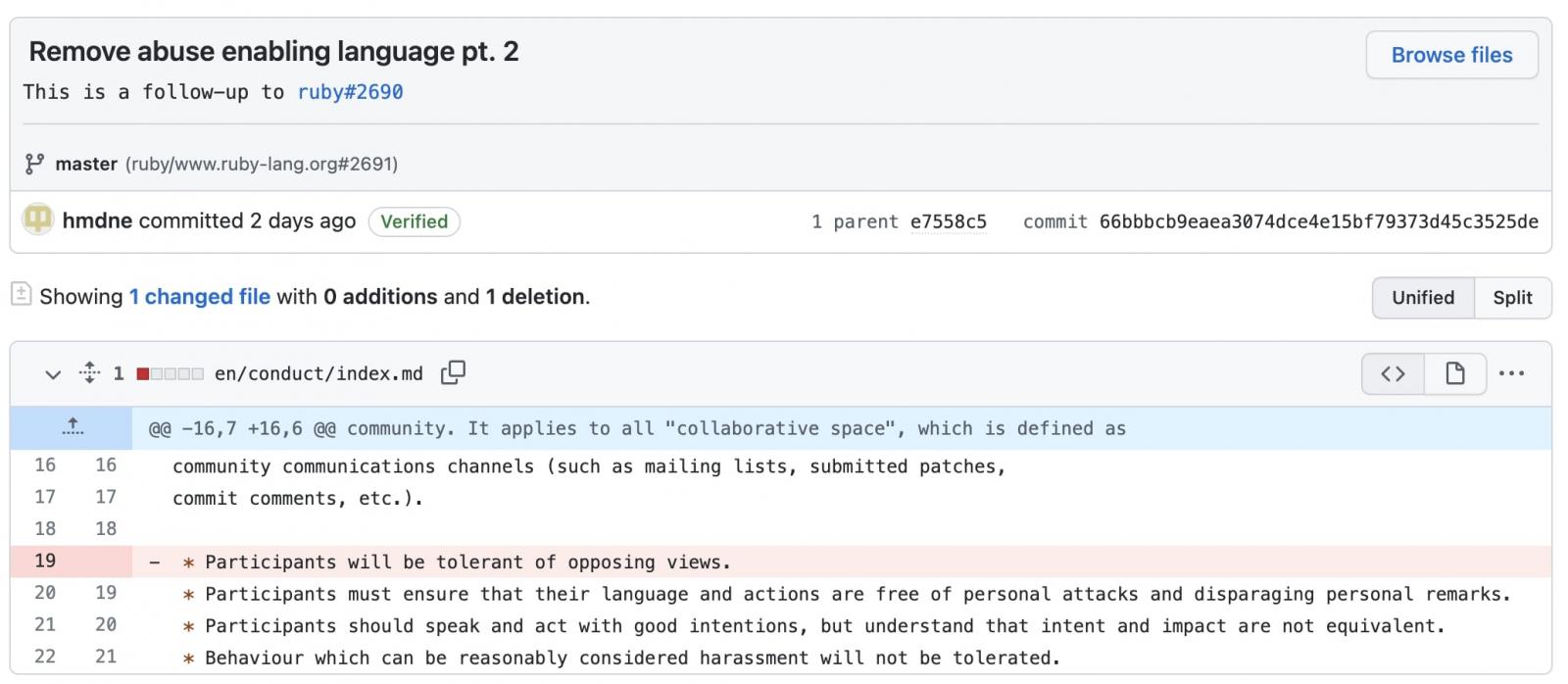KEEP IN TOUCH
Subscribe to our mailing list to get free tips on Data Protection and Cybersecurity updates weekly!







Maintainers behind the Ruby programming language have revised the project’s Code of Conduct on GitHub to remove tolerating opposing viewpoints as a prerequisite.
The decision comes after a community member was seen posting a joke that many deemed sexist and ageist.
Ruby’s Code of Conduct has historically stated that community members maintain regard and tolerance for each other’s viewpoints, even if they aren’t always in agreement:
.jpg)
But, on September 29th, in a pull request titled, “Remove abuse enabling language,” software engineer Jake Herrington proposed that Ruby’s Code of Conduct be revised to ensure everyone in the community feels safe.
Herrington’s initially proposed change to the code was minimal: changing that participants should “always assume good intentions” when interpreting words and actions of others to “participants should speak and act with good intentions, but understand that intent and impact are not equivalent.“
Also Read: National Cybersecurity Awareness Campaign of Singapore: Better Cyber Safe than Sorry
But, a pseudonymous GitHub member urged that the document be further revised to take out the line on opposing viewpoints.
“Some people may have views that when expressed, may be harmful to the interest of particular groups of people like big corporations. This has to be taken into account,” suggested the user.
The following day, Ruby’s documentation was further updated to convey the suggested language, as confirmed by BleepingComputer:

The change is now live on the Ruby website.
Herrington’s rationale behind the swift move is based on a recent action of a community member. In the Ruby mailing list, the member is seen posting a note on how Ruby’s Date.today method behaves, along with a sexist remark.
A Twitter thread by Ruby Lead and Square’s Global Neurodiversity Chair, Brandon Weaver explains what caused these changes to be made.

Many urged that the mailing list moderators step up and figure out a solution to prevent such a behavior in the future:
“Who is responsible for this mailing list? If it’s not appropriately moderated I will suggest removing references to it from [the Ruby Mailing Lists page] today,” expressed developer Olivier Lacan.
And, to a large extent, most Ruby community members have welcomed the subtle but noteworthy revisions to the Code of Conduct.
“Just wanna say thanks for publicly denouncing this behavior. What’s going on in there right now is absolutely disgusting and shameful,” tweeted Ruby developer Jemma Issroff.
But, not everyone is pleased with this approach, as seen in different places:
In the GitHub thread started by Herrington, user Brian Spilner argued that as a consequence there may be no more room for any kind of jokes, as someone is bound to get offended:
“As a consequence, there will be no more space for any kind of humor (cause someone could feel shocked)… no more general criticism (cause some ppl might feel too offended) unless we use the perfect working for that… but hang on: what if some ppl still feel offended even IF we use the right words? Do they loose [sic] the right to feel offended in that case?”
Also Read: Revised Technology Risk Management Guidelines of Singapore
Later, a debate emerged on Y Combinator’s Hacker News leaving netizens divided:

“So in the name of being inclusive, they’re bullying someone who is not a native English speaker for not knowing the nuances of political correctness in a foreign culture? Cool cool,” posted a pseudonymous user.
But, the Ruby community is pretty clear on what constitutes acceptable behavior, and that advanced technical knowledge is no excuse for poor conduct.
Ruby’s mailing list guidelines also advise to always be friendly, considerate, tactful, and tasteful, so as to keep the environment hospitable and safe for everyone.
“To be honest, I think that catering to ‘fire-breathing’ wizards is a bad policy. I don’t care what technical knowledge or context someone brings to a conversation, it shouldn’t be codified in conduct docs that Ruby ‘caters’ to jerks,” says Herrington.
“That behavior certainly doesn’t reflect the values that attracted me to the Ruby community in the first place.”
“For the sake of clarity, it is the community that keeps me in the Ruby space. If those values aren’t being lived, then why would I pick Ruby over other technically viable tools in the same space?” continues Herrington.
No matter what changes are ultimately included in the new Code of Conduct, the debate on the matter has become so polarized that there will always be someone who is upset with the outcome.
Update—Oct 3rd, 2:40 AM ET: Replaced links to tweets with archived copies as the tweets were restricted or removed after the publication of this article.